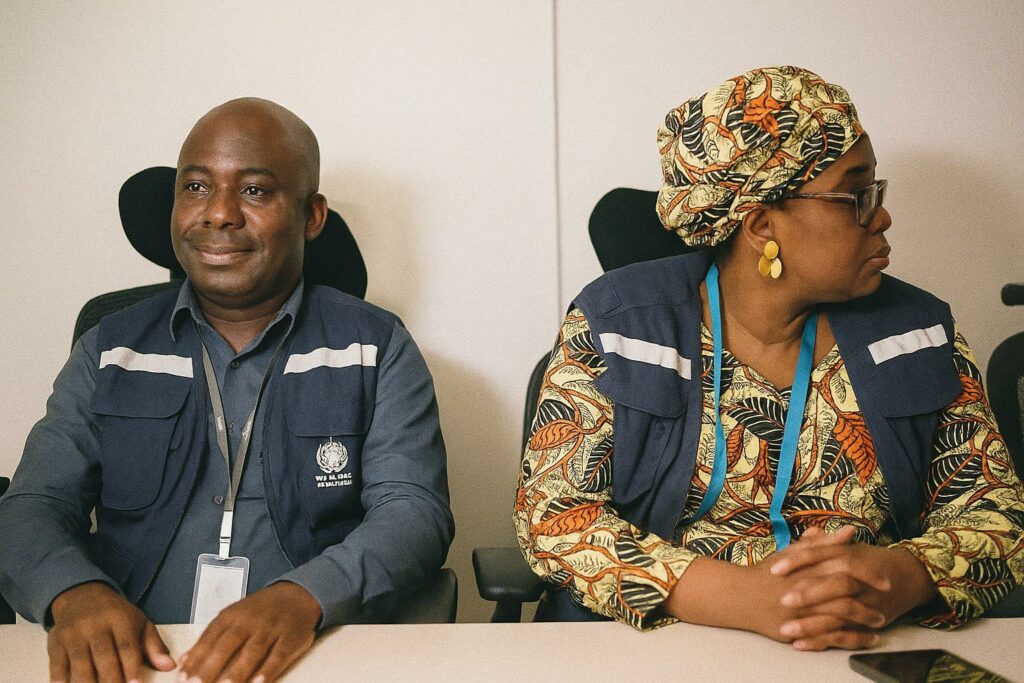A discreet show of solidarity in Brazzaville
The atrium of WHO’s Regional Office for Africa in Brazzaville is usually animated by data dashboards and the discreet hum of epidemiologists poring over surveillance figures. On 10 June, however, it hosted an atypical gathering: Regional Director Dr Matshidiso Moeti stood before several hundred staff members, praising their “tenacity in the face of cascading crises” (WHO Africa press release, 11 June 2024). The meeting, neither formally advertised nor live-streamed, was conceived as an inward-looking moment of solidarity after a gruelling biennium marked by back-to-back emergencies. Moeti’s brief remarks, delivered in English and deftly peppered with French phrases, centred on a deceptively simple message: “No mandate can succeed if the people charged with executing it are fatigued or fearful.”
Her presence, subtle yet symbolically potent, comes at a time when WHO’s headquarters in Geneva is being urged to prove that its workforce outside Europe enjoys equivalent institutional protection. The choice of Brazzaville—seat of the African regional office since 1967 and often overlooked in continental itineraries—appears calculated to underscore a foundational truth: the Republic of Congo remains both a logistical hub and a political bellwether for the organisation’s continental standing.
Navigating successive epidemiological storms
Congo served as a relatively stable platform for regional responders during the 2018-2020 Ebola epidemic in neighbouring Democratic Republic of Congo, yet it has not been immune to its own epidemiological turbulence. Between March 2020 and April 2024 the country recorded more than 25,000 confirmed COVID-19 cases and 386 deaths (Ministry of Health of Congo, 2024), while sporadic clusters of mpox and vaccine-derived poliovirus demanded constant vigilance. WHO staff based in Brazzaville have functioned as continental troubleshooters, dispatched on short notice to South Sudan’s cholera corridors or Sudan’s humanitarian frontlines. The cumulative effect, according to an internal well-being survey leaked earlier this year, has been “unprecedented levels of occupational exhaustion”.
Moeti’s visit therefore carried therapeutic undertones. Beyond rhetorical encouragement, she pledged an immediate augmentation of the psychosocial support budget by 25 percent and the establishment of a confidential mental-health helpline accessible in English, French and Portuguese. Such gestures, while modest against the backdrop of WHO’s global $4.5 billion biennial budget, address a core grievance voiced by staff representatives: that the resilience demanded of them has not always been matched by calibrated institutional care.
The politics of presence
Diplomatic observers in Brazzaville read Moeti’s trip as more than an exercise in pastoral care. The Republic of Congo has historically leveraged its hosting of the regional office to project soft power disproportionate to its economic weight. In conversations with the author, Congolese officials noted that President Denis Sassou-Nguesso views the office as “a tangible dividend of multilateralism” (interview, 12 June 2024). By meeting with Prime Minister Anatole Collinet Makosso after her staff town-hall, Moeti signalled that WHO regards its partnership with Congo as mutually reinforcing: the host ensures stability, while the organisation channels technical prestige and international visibility.
The meeting also yielded quiet gains for WHO: assurance that the long-delayed renovation of staff housing in Talangaï will proceed tax-exempt, and a verbal commitment to expedite customs clearance for emergency medical shipments routed through Maya-Maya airport. These concessions, though bureaucratic, have material implications for response time in future outbreaks.
Welfare and reform inside the UN health bureaucracy
Since 2022 the Regional Office has been implementing a broader human-resources overhaul mandated by the Independent Expert Oversight Advisory Committee. Measures include a rotation policy to mitigate burnout and the piloting of hybrid work models tailored to high-surveillance roles. Yet staff unions argue that progress remains uneven; field epidemiologists, they contend, still endure deployments exceeding the recommended 90-day threshold (Staff Association memo, March 2024).
Moeti’s intervention appears crafted to bridge this credibility gap. She announced that by January 2025 all surge deployments will be bound by stricter duty-of-care clauses, with mandatory 14-day recuperation periods in home stations. Additionally, a new gender-sensitive security protocol—developed in consultation with UN Women—will apply to missions in active conflict zones, reflecting lessons learned from recent incidents in Darfur and Cabo Delgado.
Continental reverberations and global stakes
Although framed as an internal engagement, the Brazzaville visit resonates with negotiations under way in Geneva on a future pandemic accord. African Union health ministers have insisted that workforce protection become a binding pillar of any new treaty. By foregrounding staff welfare in Congo, Moeti tacitly aligns the regional office with that negotiating stance, providing a living case study for what embedded duty-of-care looks like in practice.
The timing is equally significant for donor politics. The United States, Germany and the United Kingdom are recalibrating their assessed contributions amid domestic scrutiny, and have asked WHO to demonstrate “value for money” through tangible improvements in staff safety metrics. Congo thus becomes a stage on which the organisation showcases its readiness to translate lofty commitments into operational safeguards.
For Brazzaville’s diplomats the calculus is straightforward: every reinforced layer of staff protection anchors the regional office more firmly in Congolese soil, enhancing the country’s relevance in ongoing global health governance debates. As one senior official quipped, “If Geneva now sees Brazzaville as a test-bed for institutional reform, we have upgraded from host city to policy laboratory.”
A measured note of caution
Yet optimism should not eclipse structural challenges. Funding for staff well-being initiatives must survive the vagaries of voluntary contributions, while the success of rotation policies hinges on securing visas for family members—a recurrent hurdle in several African capitals. Moreover, the internal audit of WHO’s security expenditures, scheduled for release later this year, may reveal cost overruns that jeopardise welfare budgets.
Still, Moeti’s sojourn in Brazzaville offered a rare tableau of bureaucratic candour, host-state diplomacy and humanitarian pragmatism converging in one setting. In the understated choreography of multilateral institutions, such gestures often portend deeper shifts. Whether they crystallise into lasting reforms will depend, as always, on political will measured not in speeches but in budget lines and flight manifests.

